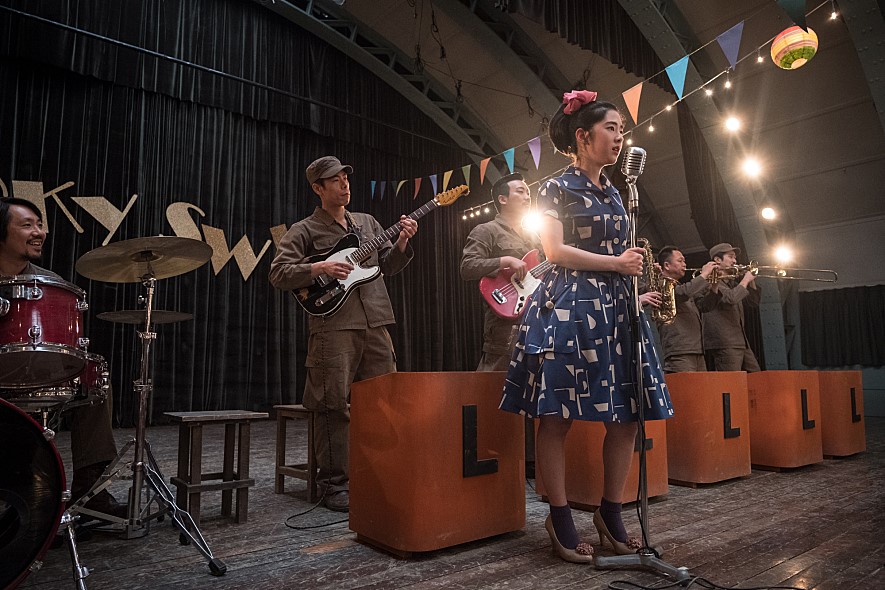
There are several spirited moments in South Korean film “Swing Kids”, a funny, delightful comedy drama movie about a group of different characters trying to do a tap dance performance at a Korean War prison camp. Although it starts to lose its comic momentum during its second half and its melodramatic ending feels rather jarring compared to the climatic performance sequence preceding it, the movie is still one of more enjoyable South Korean movies during this year, and I had a fairly good time on the whole.
The movie is set in Geoje prison camp in South Korea, 1952. While the Korean War reached to stalemate around that time, thousands of North Korean and Chinese prisoners of war were sent to that prison camp located in Geoje Island, and things do not particularly good when the new warden of the prison comes not long after a massive violent conflict between two opposing groups of North Korean prisoners. While one group still sticks to North Korea, the other group decides to stay in South Korea, and these two groups constantly clash with each other even though they are now separated from each other.
For improving the public image of his prison camp, the warden comes to plan a special entertainment event to be watched by not only prisoners but also a bunch of international reporters, and he soon approaches to Jackson (Jared Grimes), an African American sergeant who was a professional Broadway dancer before joining the US Army. While he is not so eager to prepare for a tap dance performance as ordered by the warden, Jackson has no choice but to follow the order as the warden suggests a reward he cannot refuse, so he starts to look for anyone who can dance well enough with him, but, of course, he soon gets frustrated while joylessly watching many clumsy attempts to dance in front of him.

However, fortunately, he comes to find three candidates good enough for him. While Byung-sam (Oh Jung-se), a civilian who happens to be stuck in the prison camp by misfortune, impresses Jackson a lot with his strenuous dance, Xiao Fang (Kim Min-ho), a chubby Chinese prisoner with some health problem, shows considerable agility in his dance movements, and Pan-rae (Park Hye-su), a young South Korean girl who often come to the prison camp along with other pretty South Korean women ready to entertain and attract American soldiers, easily joins the group because she can speak not only Korean and English but also Japanese and Chinese.
Meanwhile, Jackson wants to recruit another figure into his group, and that person is none other than Ki-soo (Do Kyung-soo), a young, rebellious North Korea soldier who showed his notable dancing skill at an unauthorized dance party for American soldiers. Because he is not much interested in tap dance mainly due to his ideological position opposing to US and capitalism, Kyung-soo refuses to join Jackson’s group, but, as shown from one humorous scene pulsating with an impressively rhythmic mix of sound effects, he cannot help but think more and more of tap dane after Jackson demonstrates his tap dance skill to Kyung-soo at one point, and he eventually comes to decide to join the group.
As these five main characters come to stick together through the joy of music and dance despite many differences among them (is this a spoiler?), the movie bounces from one amusing moment to another while also providing plenty of dance scenes. While I enjoyed a sudden unexpected dance battle unfolded in a storage, I found myself smiling a lot during a silly but uproarious sequence where Ki-soo and other two main characters attempt an impromptu performance in front of many people including the warden, and the effective use of music during these and other key scenes in the film further increases the level of hilarity.

However, the movie becomes quite more serious around the middle point of the story. As a couple of certain North Korean supporting characters enter the picture, the circumstance becomes quite dangerous for Ki-soo, and, not so surprisingly, there inevitably comes a point where he must make a choice as he and his other group members are finally ready to present their performance on the stage.
Although its second half does not entirely work due to its incoherent mix of comedy and melodrama, the movie remains to be engaging enough to hold our attention thanks to the joyful efforts from its five main cast members, who prepared a lot for their tap dance scenes in the movie and, as far as I could see from the film, look quite convincing together with good chemistry among them. While Do Kyung-soo is the most prominent one in the bunch as a singer/actor who has been quite popular in South Korea, Jared Grimes, who is actually a professional dancer and choreographer from Broadway, gives an earnest performance holding the ground well for his co-performers, and Park Hye-su, Oh Jung-se, and Kim Min-ho are also solid in their respective colorful roles.
“Swing Kids” is directed and written by Kang Hyeong-cheol, who previously made “Scandal Makers” (2008) and “Sunny” (2011). Although I did not like “Scandal Makers” enough for recommendation, I had some good laughs while recognizing Kang’s considerable skill and talent, and I was certainly delighted and entertained a lot by many funny moments in “Sunny”, which was one of my best South Korean films of 2011. “Swing Kids” is less successful compared to “Sunny” mainly due to its several notable flaws including its uneven storytelling, but I will not deny that I had enough fun and entertainment at last night.








Pingback: 10 movies of 2018 – and more: Part 3 | Seongyong's Private Place